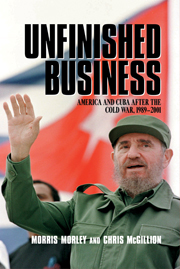Book contents
- Frontmatter
- Contents
- Acknowledgments
- Introduction
- 1 The Bush Administration and Cuba: From Cold War to Deep Freeze
- 2 Clinton and Cuba, January 1993 to February 1996: Closing the Options
- 3 Helms–Burton and the Triumph of Politics over Policy
- 4 Stirring the Waters: Clinton's Missed Opportunities
- Conclusion
- Postscript: Washington's Last Cold War
- Notes
- Index
Conclusion
Published online by Cambridge University Press: 28 July 2009
- Frontmatter
- Contents
- Acknowledgments
- Introduction
- 1 The Bush Administration and Cuba: From Cold War to Deep Freeze
- 2 Clinton and Cuba, January 1993 to February 1996: Closing the Options
- 3 Helms–Burton and the Triumph of Politics over Policy
- 4 Stirring the Waters: Clinton's Missed Opportunities
- Conclusion
- Postscript: Washington's Last Cold War
- Notes
- Index
Summary
THE post–Cold War international environment had a contradictory effect on Washington and Havana: Whereas the former deepened its adversarial posture, the latter systematically reversed what U.S. policymakers previously described as “obstacles” to improved bilateral ties; whereas the White House perceived the end of the Cold War as an invitation to intensify its pressure on the Cuban Revolution, new harsh global realities had pushed Cuba in the opposite direction as it moderated its policies toward the capitalist world, including overtures to the dominant hegemon to its north. Both the Bush and Clinton administrations, however, interpreted Cuban concessions as a vindication of their approach – as weakness gained through U.S. pressure rather than as pragmatic adjustments to a new and changing international order. Reciprocating Cuba's opening to the world market and engagement in regional diplomacy consisted of tightening economic sanctions measures, heightening the ideological war, condemning Cuba's human rights performance by standards inconsistently applied in other parts of the world, and placing conditions on normalized relations that amounted to a demand for an end to the revolutionary regime and its institutional structures.
The collapse of the Soviet Union and Eastern Europe profoundly influenced George Bush's approach toward Cuba, triggering a belief that the devastating impact of the Bloc's demise on the island economy might make Fidel Castro's regime the next communist domino to fall.
- Type
- Chapter
- Information
- Unfinished BusinessAmerica and Cuba after the Cold War, 1989–2001, pp. 176 - 184Publisher: Cambridge University PressPrint publication year: 2002



